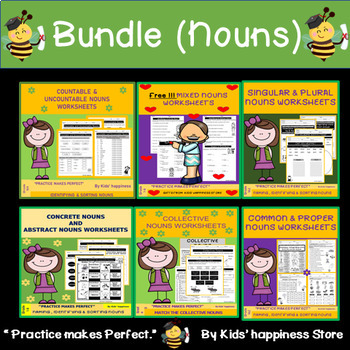Parts of Speech ( Nouns)
- Zip
Products in this Bundle (6)
showing 1-5 of 6 products
Bonus
Description
Parts of Speech ( Nouns)
A noun is a word that names something, such as a person, place, thing, or idea. In a sentence, nouns can play the role of subject, and object.
Types of nouns
1. Proper nouns vs. common nouns
One important distinction to be made is whether a noun is a proper noun or a common noun. A proper noun is a specific name of a person, place, or thing, and is always capitalized.
2. Countable nouns vs. uncountable nouns
Countable nouns are nouns which can be counted, even if the number might be extraordinarily high (like counting all the people in the world). Countable nouns can be used with a/an, the, some, any, a few, and many.
Uncountable nouns, are nouns that come in a state or quantity that is impossible to count; liquids are uncountable, as are things that act like liquids (sand, air). Uncountable nouns are always considered to be singular, and can stand alone or be used with some, any, a little, and much.
3.Concrete vs. abstract nouns
Concrete nouns refer to physical objects, places, or individuals: things or people that can be observed with the senses, such as “apple,” “hill,” “zebra,” and “Dorothy.”
Abstract nouns refer to concepts, ideas, feelings, and processes that can’t be physically located, such as “grammar,” “justice,” “sadness,” and “relaxation.”
4.Collective nouns
A collective noun is a word used to refer to a group of people or things, such as “team,” “band,” or “herd.”
5. Singular vs Plural nouns
Singular means only one. Plural means more than one.
For the plural form of most nouns, add s.
- bottle – bottles
- cup – cups
- pencil – pencils
- desk – desks
- sticker – stickers
- window – windows
For nouns that end in ch, x, s, or s sounds, add es.
- box – boxes
- watch – watches
- moss – mosses
- bus – buses
For nouns ending in f or fe, change f to v and add es.
- wolf – wolves
- wife – wives
- leaf – leaves
- life – lives
Some nouns have different plural forms.
- child – children
- woman – women
- man – men
- mouse – mice
- goose – geese
Nouns ending in vowels like y or o do not have definite rules.
- baby – babies
- toy – toys
- kidney – kidneys
- potato – potatoes
- memo – memos
- stereo – stereos
A few nouns have the same singular and plural forms.
- sheep – sheep
- deer – deer
- series – series
- species – specie
Mixed worksheets for kids to practice about Nouns ..... Bonus for Christmas and New Year 2023.... Hope you all enjoy practicing !!!
Love kids,
Kids' happiness Store


